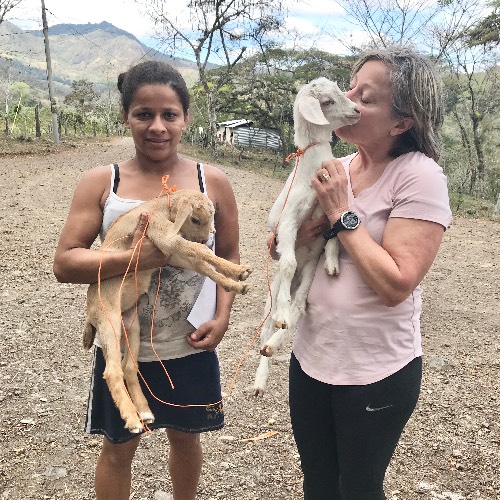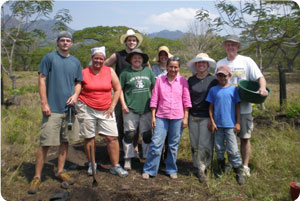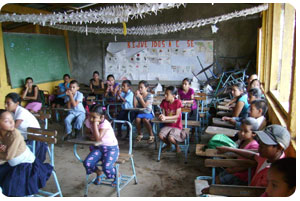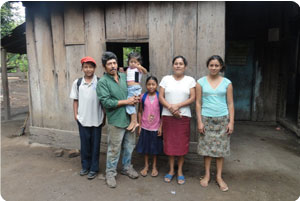Rocha Nicaragua Service Learning Project:
2020 Rocha Project Goat Fund
Rocha Nicaragua Project Photo Gallery
 The Rocha, Nicaragua Project began in 2007 when a group of five Winthrop Students
and Dr. Ginger Williams, of the Winthrop history department, travelled to Nicaragua and Guatemala on an international
service-learning trip. Our work in Nicaragua was to dig for artifacts that were discovered
while a farmer was planting trees on his land. In Guatemala we participated in an
eco-tourism project. This started out as a one shot service-learning project. Little
did we know that nine years later we would still be involved in Nicaragua.
The Rocha, Nicaragua Project began in 2007 when a group of five Winthrop Students
and Dr. Ginger Williams, of the Winthrop history department, travelled to Nicaragua and Guatemala on an international
service-learning trip. Our work in Nicaragua was to dig for artifacts that were discovered
while a farmer was planting trees on his land. In Guatemala we participated in an
eco-tourism project. This started out as a one shot service-learning project. Little
did we know that nine years later we would still be involved in Nicaragua.
While in Nicaragua we noticed that many of the children were not in school. We were told they didn't have the money for supplies and uniforms and they couldn't cross the river during the rainy season. Further questions about the community revealed that this particular part of Nicaragua was especially hard hit during the civil war of the 1980s; the community of Rocha was bombed practically every day for a ten year period.
The adults in the community didn't have the opportunity to go to school during the civil war. Before we left, the adults of the community asked us for help in building them a school. When we returned home we raised the money to build a one room school house that was constructed in March of 2008.
 Over the next couple of years I travelled to Nicaragua a couple of times per year
meeting with community members in Rocha and Tierra Blanca and working with a Nicaraguan
nonprofit organization called ANIDES, and a Costa Rican nonprofit organization, Reto
Juvenil, to help identify some of the most important needs in the communities.
Over the next couple of years I travelled to Nicaragua a couple of times per year
meeting with community members in Rocha and Tierra Blanca and working with a Nicaraguan
nonprofit organization called ANIDES, and a Costa Rican nonprofit organization, Reto
Juvenil, to help identify some of the most important needs in the communities.
I decided to bring student groups from Winthrop to help target those needs by doing service projects for periods of one week to ten days. One year the people of Rocha asked for dental care, and we brought a dentist with us who set up a makeshift dental clinic. We have planted two community gardens; taught English lessons, and reconstructed roads, all at the request of community members. Small projects serve a purpose, but ultimately we want to participate in helping people in these rural Nicaraguan communities meet their own needs. Because the community of Rocha lacked latrines and access to water, in 2013 we promised that Winthrop University students and faculty would help acquire a new water system and build 30 latrines in three years. In 2016 we finished this project. We know that having access to water will help the community work on realizing goals beyond those of basic survival. Fulfilling the commitment of the three-year project helps us build trust in a community that spent so many years in hiding.
As part of the Rocha, Nicaragua Project, Dr. Jeannie Haubert, of the Winthrop University
Sociology department and I sent three student researchers in 2010 and 2011 that collected
survey data and interviewed individual community members about their individual capacities
and goals. We work with community members on building their strengths so that they
can solve some of the problems that face them such as persistent poverty, hunger,
lack of land ownership, and lack of education, so that they can become more sustainable
societies.
Each year, students travel to Nicaragua with Winthrop University professors to undertake service-learning projects through interdisciplinary opportunities. In March 2016, the history and nutrition students who participated in this class were the ninth group of students to travel to Nicaragua as part of a course embedded program. Dr. Peter Phillips has brought Biology students to Nicaraua to test water sources; Dr. Wendy Campbell has brouht Social Work students to analyze needs in the community. The Human Nutrition department has sent students every year since 2008 to work on nutrition projects in the community. Dr. Simone Camel directs the Human Nutrition department projects in Nicaragua. Dr. Matt Heard and Dr. Cynthia Tant, both from the Winthrop department of Biology helped instruct our students on how to test the water in Rocha and Tierra Blanca for water-borne diseases. Many different Winthrop faculty have shared their expertise with the Rocha Project.
The Rocha, Nicaragua Project provides students with wonderful opportunities to give back to a developing country that is making its way back from civil war and underdevelopment. It also provides ways for students to learn about poverty, underdevelopment, and ways to overcome underdevelopment in the 21st century.
For more information about the Rocha, Nicaragua Project contact Dr. Ginger Williams at williamsv@winthrop.edu or call her at 803/323-4680.